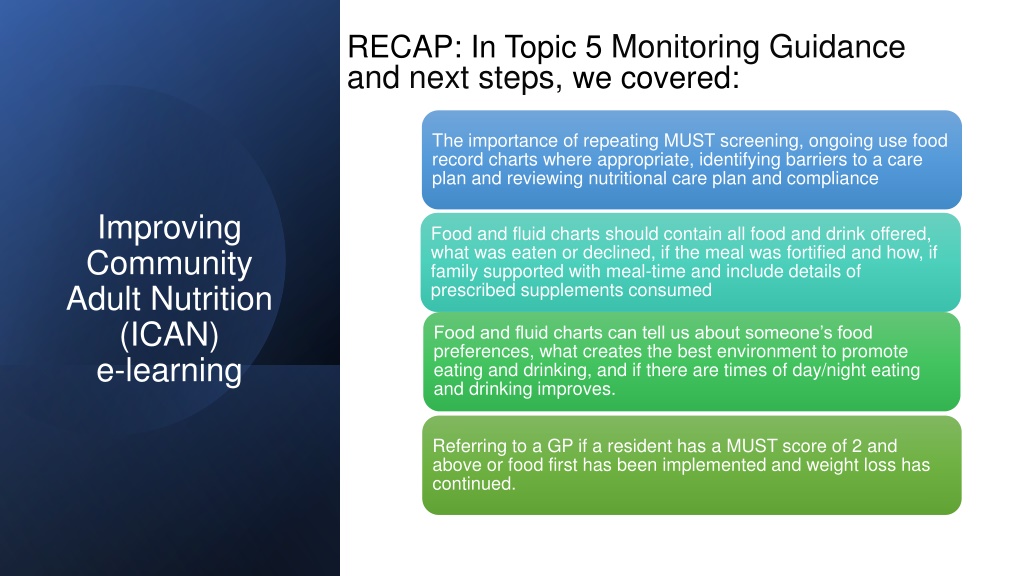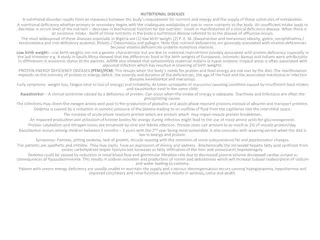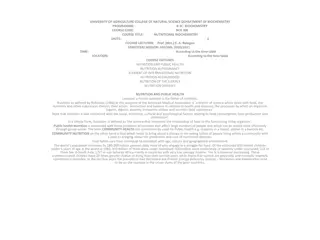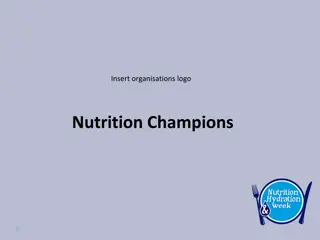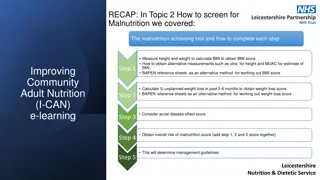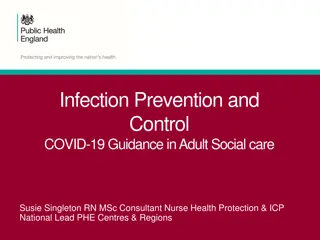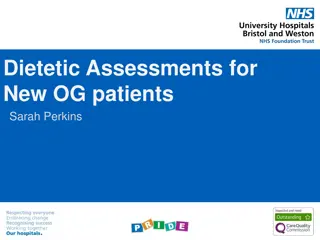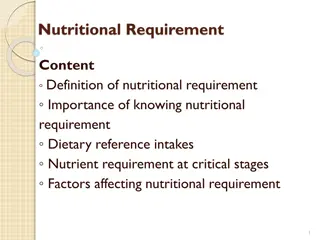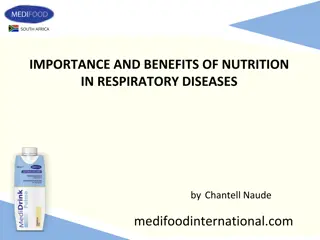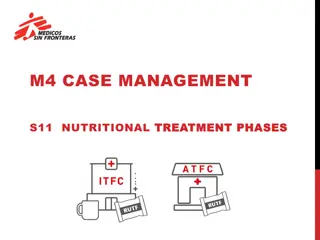Importance of Monitoring Guidance in Nutritional Care
This recap covers the significance of regular screening, using food record charts, identifying barriers to care plans, and reviewing nutritional compliance. It emphasizes the ICAN e-learning module and the key factors influencing nutritional care. The content highlights the importance of adequate fluid intake, nutrition for specific diets, oral health, and more. Addressing hydration levels is vital as it impacts various health aspects like dehydration, blood pressure, and mental function.
Download Presentation

Please find below an Image/Link to download the presentation.
The content on the website is provided AS IS for your information and personal use only. It may not be sold, licensed, or shared on other websites without obtaining consent from the author.If you encounter any issues during the download, it is possible that the publisher has removed the file from their server.
You are allowed to download the files provided on this website for personal or commercial use, subject to the condition that they are used lawfully. All files are the property of their respective owners.
The content on the website is provided AS IS for your information and personal use only. It may not be sold, licensed, or shared on other websites without obtaining consent from the author.
E N D
Presentation Transcript
RECAP: In Topic 5 Monitoring Guidance and next steps, we covered: The importance of repeating MUST screening, ongoing use food record charts where appropriate, identifying barriers to a care plan and reviewing nutritional care plan and compliance Improving Community Adult Nutrition (ICAN) e-learning Food and fluid charts should contain all food and drink offered, what was eaten or declined, if the meal was fortified and how, if family supported with meal-time and include details of prescribed supplements consumed Food and fluid charts can tell us about someone s food preferences, what creates the best environment to promote eating and drinking, and if there are times of day/night eating and drinking improves. Referring to a GP if a resident has a MUST score of 2 and above or food first has been implemented and weight loss has continued.
Leicestershire Nutrition & Dietetic Service ICAN - Additional KEY factors that influence nutritional care Please DO NOT save or share this PowerPoint to avoid circulation of out of date information
The aims of this PowerPoint is to highlight some of the additional factors that influence nutritional care: Fluid requirements for adequate hydration Nutrition for South Asian Diet and African and Caribbean Diet Oral health/Dentition Allergies Bowel Health Skin Health Useful Links- LNDS, LLRAPC, Dietetic Referral Criteria etc
Adequate fluids: Benefits of good hydration Implication of dehydration Causes of dehydration Signs of dehydration
Benefits of good hydration Good hydration is one of the most important aspects of the diet drinking enough liquids to keep the fluid levels in the body topped up helps to ensure that all bodily functions are able to take place as normal.
Hydration levels can impact on the following: f dehydration Low blood pressure Constipation Urine infections Increased risk of hospital admissions Mental function Falls
Causes of dehydration Vomiting More fluid is lost due to Confusion or memory loss Nausea Intake of fluid is reduced by Pressure sores Diarrhoea Poor mobility Drinks out of reach Fever Fluid requirements are increased by Hot weather
Dark and strong-smelling urine (Key indicator) Urinating fewer than 4 times a day Irritable and tired Some signs of dehydration Feeling dizzy or light-headed Headache Confusion or mood change Dry mouth, lips and eyes Feeling thirsty
According to the national Eatwell guide, general fluid intake should be around 6- 8 cups or glasses per day Some foods have higher fluid content for example fruits such as melon, yoghurts, soup, milk added to cereal and can help contribute towards fluid intake General guide to fluid requirements Please click here for more information on the ideal colour for urine
Sources of fluids 80% of water comes from drinks, 20% is in food Drinks can include any fluids excluding alcohol Sauces, soup, gravy, milky puddings, custard, yoghurts, fruits and vegetables Helping patients drink well Give extra fluid with medication Find out when and how they like to drink right temperature, variety, brand Encourage, support, accessibility to drinks Drinking is part of socialising time Identify residents at risk of dehydration or those that require assistance and monitor and record their fluid intake
Skin Health Those with pressure sores/ulcers should have a nutritional care plan which is focused on adequate energy, protein and a nutrient dense diet to protect their skin from deteriorating, and promote wound healing. The patients should be referred to a tissue viability nurse for support. Please see BDA factsheet on Pressure Injuries for more information. Allergies Should be clearly documented and all efforts should be made to ensure an appropriate nutritionally complete diet is provided with suitable alternatives. Oral Health/Dentition Good oral health/appropriate dentition is important to ensure good nutritional oral intake. Always seek support from GP and/or dentist at earliest signs of possible dentition concerns. E.g. if patient suffers from dry mouth, a GP may provide artificial saliva to help improve patients oral intake.
Bowels Constipation and/or diarrhoea can impact on nutritional status. It is important to reflect on patients current oral intake. This can be done by monitoring food/fluid charts as well as reviewing whether change in medication has had an impact on their bowels and seek advice appropriately. Bristol Stool Chart provides a good visual when documenting bowel movements and is a good indicator for identifying any bowel issues. Increase in fluids can improve symptoms of constipation and prevent dehydration caused by diarrhoea. However, if increase in fluids changes do not improve symptoms, then seek advice from GP.
Nutrition for South Asian Diet Click here to find out more information on each food group
Nutrition for African and Caribbean Diet Click here to find out more information on each food group
Please also see the ICAN- e-learning Reference Sheet on our LNDS Website for all links included within PowerPoints 1-6 Leicestershire Nutrition and Dietetic Service (LNDS) website: - Provides a range of dietary resources to support general health and different conditions. - List of contact details - Referral criteria British Dietetic Association (BDA) website: - Provides a range of resources for adults and older adults, see Food Fact sheets Useful Links - Managing Malnutrition: Leaflets for Patients and Carers (malnutritionpathway.co.uk) British Association for Parenteral and Enteral Nutrition (BAPEN) website for MUST information and tools Leicester, Leicestershire and Rutland Area Prescribing Committee (LLRAPC) Managing Malnutrition in Adults in Primary Care guidelines. Providing Care website- Nutrition
Summary It is time to check your knowledge on nutrition and hydration for adults in community settings to ensure that you are confident with applying your learning in your work setting. Please complete the overall knowledge check assessment in order to receive your certificate. This is a set of multiple choice questions which will ensure that you have learnt and understood the key factors to support your patients This assessment also includes some questions on evaluating your learning from this training course. This questionnaire can be accessed directly from our website where the training course material is located.
